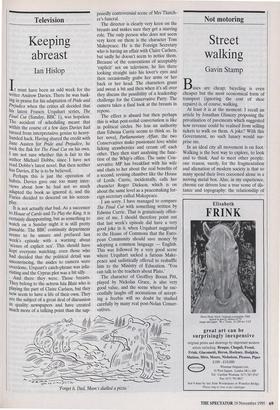Television
Keeping abreast
Ian Hislop
It must have been an odd week for the Writer Andrew Davies. There he was bask- mg in praise for his adaptation of Pride and Prejudice when the critics all decided that his latest Francis Urquhart series, The Final Cut (Sunday, BBC 1), was hopeless. The accident of scheduling meant that within the course of a few days Davies had turned from interpretative genius to heavy- handed hack. Having shared the credit with Jane Austen for Pride and Prejudice, he took the flak for The Final Cut on his own. I am not sure whether this is fair to the author Michael Dobbs, since I have not read Dobbs's latest novel. But then neither has Davies, if he is to be believed.
Perhaps this is just the operation of hubris. Davies gave one too many inter- views about how he had not so much adapted the book as ignored it, and the Furies decided to descend on his screen- play.
It is not actually that bad. As a successor to House of Cards and To Play the King, it is certainly disappointing, but as something to watch on a Sunday night it is still pretty Passable. The BBC continuity department seems to be unsure and prefaced last week's episode with a warning about scenes of explicit sex'. This should have kept everyone watching, even those who had decided that the political detail was unconvincing, the asides to camera were overdone, Urquart's catch-phrase was infu- riating and the Cyprus plot was a bit silly.
And there they were. Those breasts. They belong to the actress Isla Blair who is Playing the part of Claire Carlsen, but they now seem to have a life of their own. They are the subject of a great deal of discussion in quality newspapers and have created much more of a talking point than the sup- posedly controversial scene of Mrs Thatch- er's funeral.
The director is clearly very keen on the breasts and makes sure they get a starring role. The only person who does not seem very keen on them is the character Tom Makepeace. He is the Foreign Secretary who is having an affair with Claire Carlsen, but sadly he doesn't seem to notice them. Because of the conventions of acceptably `explicit' sex on television, he lies there looking straight into his lover's eyes and then occasionally grabs her arms or her back or her head. The characters grunt and sweat a bit and then when it's all over they discuss the possibility of a leadership challenge for the Conservative Party. The camera takes a final look at the breasts in repose. The effect is absurd but then perhaps this is what post-coital conversation is like in political circles. No less an authority than Edwina Currie seems to think so. In her novel, Parliamentary Affair, the two Conservatives make passionate love whilst licking strawberries and cream off each other. They then start analysing the func- tion of the Whip's office. The same Con- servative MP has breakfast with his wife and chats to her about the real benefits of a second, revising chamber like the House of Lords. Currie, incidentally, calls her character Roger Dickson, which is on about the same level as a peacemaking for- eign secretary called Makepeace. I am sorry. I have managed to compare The Final Cut with something written by Edwina Currie. That is gratuitously offen- sive of me. I should therefore point out that last week's episode did have a very good joke in it, when Urquhart suggested to the House of Commons that the Euro- pean Community should save money by adopting a common language — English. This was followed by a very good scene where Urquhart sacked a furious Make- peace and sadistically offered to reshuffle him to the Ministry of Education. 'You can talk to the teachers about Plato.'
The character of Geoffrey Booza Pitt, played by Nickolas Grace, is also very good value, and the scene where he suc- cessfully laughs off accusations of accept- ing a freebie will no doubt be studied carefully by many real post-Nolan Conser- vatives.
`Forget it, Dad, Mum's dialled a pizza.'


















































































 Previous page
Previous page